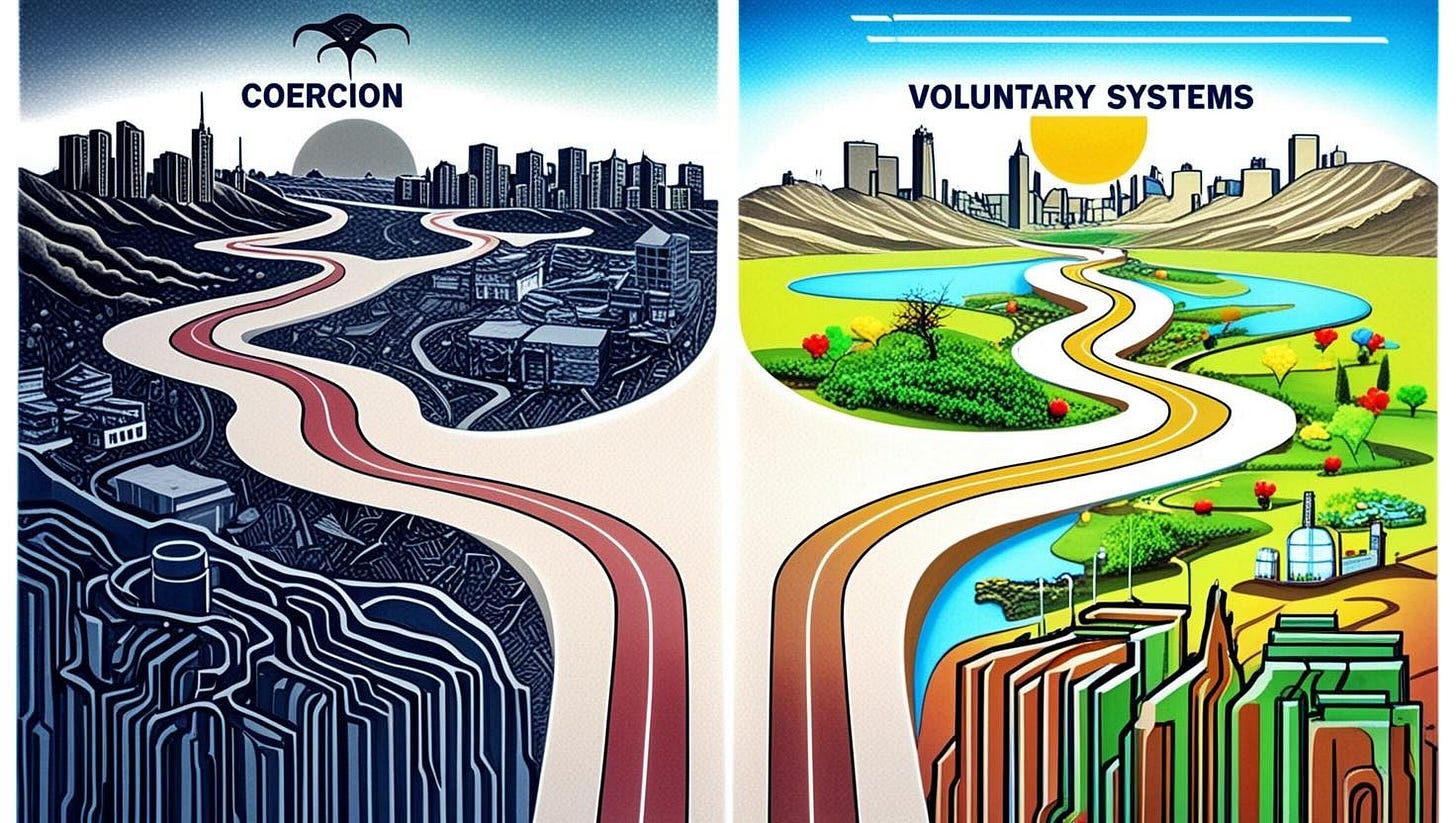Our world is evolving rapidly, yet our governance systems remain stuck in the past. As societies, economies, and technologies change, we must rethink governance itself—moving beyond outdated nation-state models to systems built on genuine consent, individual choice, and entrepreneurial innovation.
The real purpose of governance is not to perpetuate bureaucracies but to empower individuals, businesses, and communities to thrive. Spencer Heath, a visionary who blended engineering, law, and philosophy, understood this decades ago. Heath predicted that political governments would eventually be replaced by voluntary, contractual systems—a future where public goods would be provided not through coercion, but through entrepreneurial innovation.
The Failure of Coercion and the Power of Incentives
Political governance often misaligns incentives. Leaders impose rules, collect taxes, and claim to serve the public good, but they face little accountability. Decisions are made by officials with no direct stake in outcomes, leading to inefficiency, waste, and abuse of power.
Heath offered a different vision. In a voluntary system, landowners would be entrepreneurs who provide public goods—such as security, infrastructure, and rules—because their success depends on the well-being of their clients. When landowners make wise decisions, tenants prosper, property values rise, and the community flourishes. Poor governance, by contrast, leads to failure, loss of reputation, and transfer of stewardship to more capable hands.
Unlike coercive governments, entrepreneurs have no power to impose their will. They must listen, respond, and innovate to meet the needs of those they serve. Their success is measured not by votes or authority but by voluntary participation, market signals, and profit—an honest reflection of value created.
Integrity and Trust in a Free Market
For entrepreneurs, integrity is non-negotiable. In a voluntary system, trust and reputation drive success. Heath’s insights align with modern examples of what happens when businesses betray their values.
Consider Bud Light. A globally recognized brand, it alienated its core audience by hiring Dylan Mulvaney, a figure who contradicted the company’s traditional identity. The backlash was swift: customers rejected the brand, sales plummeted, and stock prices fell. Even a powerful corporation couldn’t survive breaking trust with its audience. Entrepreneurs providing governance would be even more accountable—smaller, leaner, and directly vulnerable to market forces.
This accountability ensures that governance aligns with the values of its clients. Entrepreneurs must continuously improve, innovate, and deliver what people need, whether that’s safety, infrastructure, or fair legal systems.
A Race to Serve, Not Rule
Imagine a world where entrepreneurs compete to provide governance. Communities become adaptable, experimental, and responsive to the people they serve. Instead of politicians demanding taxes and obedience, entrepreneurs offer solutions—dynamic systems where individuals choose the rules and services that match their values.
In this decentralized model, even strict rules can exist without infringing on freedom. Why? Because the rules are chosen, not imposed. Individuals voluntarily join communities that reflect their preferences, fostering harmony and mutual respect.
People don’t have to spend their productive time trying to decide between politicians, who may not keep their promises. Instead, they choose a jurisdiction where they have an enforceable contract guaranteeing their chosen set of rules won’t be changed without their explicit consent.
Small-scale jurisdictions, led by entrepreneurial innovation, create spaces to test governance models. Success depends on results, not ideology. Price signals, profits, and market feedback guide decisions, ensuring continuous improvement.
A New Vision for Freedom and Governance
This shift in governance redefines freedom as a range of meaningful choices. It replaces coercion with consent, stagnation with competition, and bureaucracy with innovation. Entrepreneurs become the architects of a reimagined society, motivated not by power but by profit and service.
In this world:
Governance is responsive and adaptable.
Rules reflect the values of the communities they serve.
Trust and reputation drive integrity.
Prosperity flourishes because incentives are aligned.
Unlike politicians who impose their will and protect their positions, entrepreneurs thrive by empowering others. They pave the way to peace, prosperity, and justice—not through mandates, but through solutions people willingly embrace.
The future of governance belongs to those who innovate, not those who rule. By embracing voluntary systems, we can create a world where individuals, families, and communities are free to flourish.



